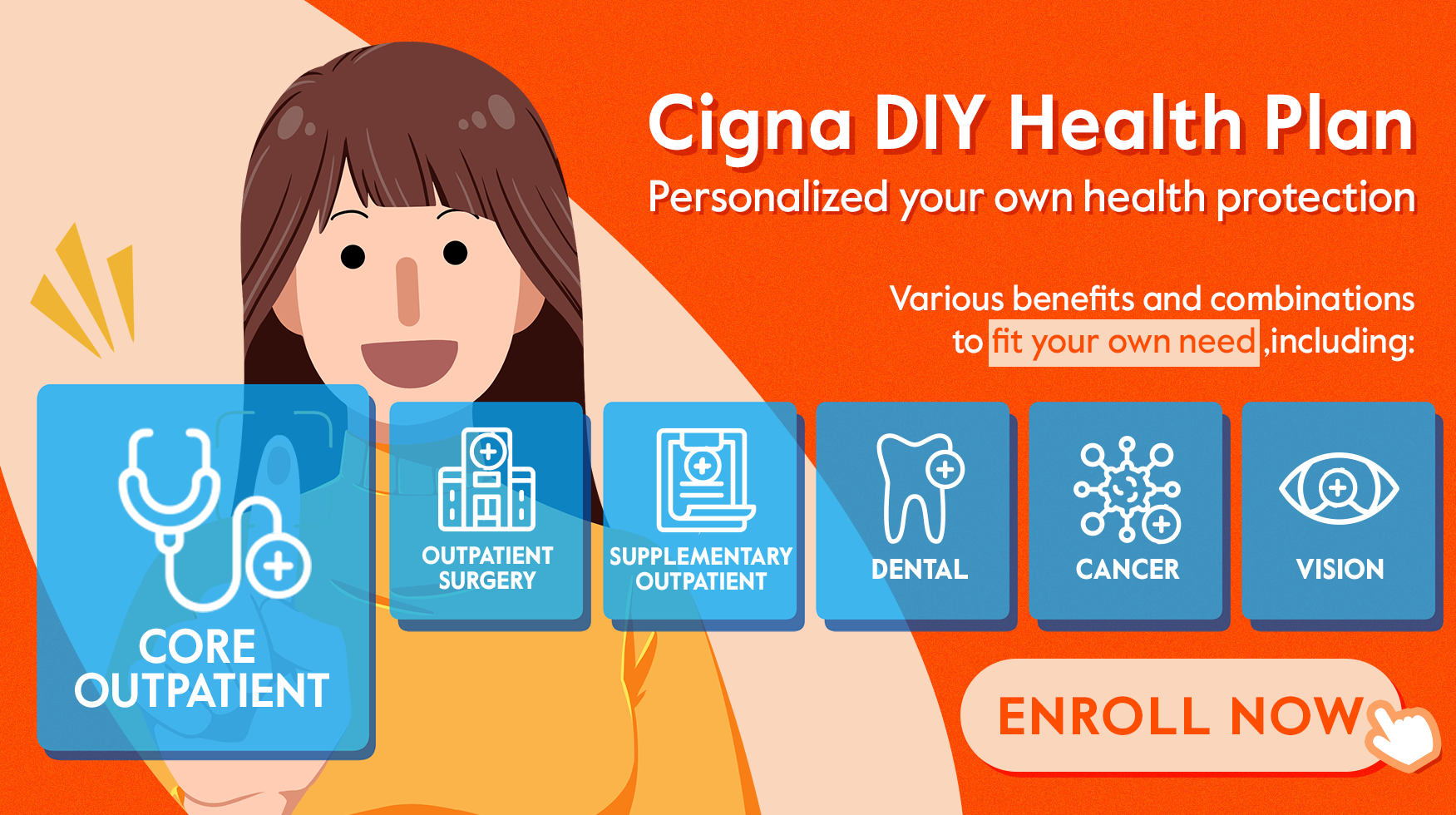Seasonal influenza and infectious diseases are usually more common during the fall and winter in Hong Kong. How do you know whether you catch a cold, flu, or even Covid-19 if you sneeze or cough badly? Let’s take a look at this Smart Health article to understand more!
Symptoms of a Cold
Dr. Tony Leung, Head of Clinical of Cigna stated that the common symptoms of a cold include running nose, cough, and sore throat. With adequate rest, people can recover from it in around one week and perform as usual during the period. Only supportive drugs are required to treat a cold, such as painkillers and nose relief drugs.
Symptoms of Flu
In general, flu is worse than a common cold. You may experience various symptoms, such as tiredness, fever, and muscle or body aches, adversely affecting your physical state and daily life. Individuals with frail health and weak immune systems, such as the elderly and those with chronic diseases, may have severe or even life-threatening complications (e.g., pneumonia) when contracting the flu. Clinically, your doctor may conduct a rapid diagnostic test for the flu. Once confirmed, your doctor may prescribe anti-influenza drugs to you, but they are only effective within one to two days after the onset. Otherwise, supportive drugs are given to improve the condition.
Symptoms of Covid-19
If you, unfortunately, contract Covid-19, you may experience numerous symptoms, some of which are similar to getting a cold and the flu. Although some cases are asymptomatic or show insignificant signs, patients in serious condition may have breathing problems, chest pain, and confusion. Since the coronavirus disease evolves into different variants, symptoms may also vary. For example, the common symptoms of the Delta variant include headache, sore throat, runny nose, then fever and cough, without loss of taste or smell.
As pointed out by Dr. Leung, the symptoms and transmission (i.e., droplet and contact transmission) of the above infections are similar, making people hard to differentiate and evaluate their conditions. Therefore, you are recommended to perform a rapid diagnostic test and visit your doctor for the proper treatment. He continued that the breakout of Covid-19 results in a higher level of personal hygiene among the public, such as wearing masks and washing their hands. Together with social distancing measures, fewer people catch a cold or the flu. He reminded everyone to continue paying attention to personal and environmental hygiene to avoid getting the virus.
Differences Between a Cold, Influenza, and Covid-19
|
Cold |
Influenza |
Covid-19 |
|
|
Pathogens |
Common viruses, such as rhinoviruses and respiratory syncytial virus (RSV) |
Influenza A and B viruses in the majority |
Severe acute respiratory syndrome coronavirus 2 (SARS-CoV-2) |
|
Common Symptoms |
Runny nose, coughing, sore throat, sneezing, nasal congestion and headache |
High fever (over 38℃), coughing, sore throat, runny nose, muscle ache, tiredness, headache, vomiting or diarrhea |
Fever, dry cough, fatigue, loss of taste or smell, nasal congestion, conjunctivitis, sore throat, headache, muscle or joint ache, rash, nausea, vomiting, diarrhea, chills, dizziness |
|
Transmission |
Droplet transmission or contacting patient’s discharge or contaminated objects |
Droplet transmission or contacting patient’s discharge or contaminated objects |
Droplet transmission or contacting patient’s discharge or contaminated objects |
|
Incubation period |
1 to 3 days for rhinoviruses; 5 to 7 days for RSV |
1 to 4 days |
Around 1 to 14 days, in average 5 days |
|
Severity |
Recover in 7 to 10 days. Individuals with a weak immune system, asthma, or other respiratory diseases may deteriorate into bronchitis and pneumonia. |
Normally recover in 2 to 7 days. Individuals with a weak immune system or the elderly may have complications, such as bronchitis, pneumonia, or death. |
Some may have breathing difficulties, chest pain, or confusion. Serious complications include respiratory failure, Septic shock, and multiple organ failure. |
|
Treatments |
Supportive drugs only, no specific medication |
Have adequate rest and water intake. Your doctor may prescribe anti-influenza medicines to relieve the conditions and foster early recovery. |
Supportive drugs only, no specific medication |
Absorb Vitamins from Your Diet
Many say that taking vitamin C supplements can prevent infecting a cold and the flu, but this saying is not grounded based on medical research. As Dr. Leung suggested, you can absorb various vitamins and nutrients in your diet, such as including colorful vegetables and fruits. Oranges, kiwis, and strawberries are also rich in vitamin C. He reminded everyone not to overdose on vitamin supplements, especially those with vitamin C, as it may lead to diarrhea and increase your risk of kidney stones. Adequate sleep, stress relief, and regular exercises can raise your immunity to fight against diseases. If you are in doubt, please consult your doctor for advice!
The health benefit of vitamin C on common cold prevention was initially promoted by Nobel prized scientist Pauling,, in the 70s. According to his research, large doses of vitamin C can effectively prevent the common cold, even for kids living in extremely cold weather.
Prevention Tips for Falling Sick
1. Adequate rest to boost immunity
2. Stress relief, such as exercising
3. Avoid touching objects in the public spaces and your eyes, nose, and mouth
4. Get vaccinated
5. Maintain the airflow and ventilation in indoor spaces
6. Maintain your personal hygiene, such as washing and sterilizing your hands
7. Stay at home if you are sick, and avoid crowded places
8. Regularly (about once a week) pour about half a liter of water into each drain outlet (U-trap) to ensure environmental hygiene
If you suspect an upper respiratory tract infection, please visit your doctor at your earliest advance to identify the cause and receive proper treatments. Cigna DIY Health Plan enables you to tailor your health protection to serve your needs. Stay well covered with various valuable benefits to choose from, including Vision Benefits that cover eye examination with an allowance for glasses or contact lenses. Click here to learn more about this DIY insurance.


